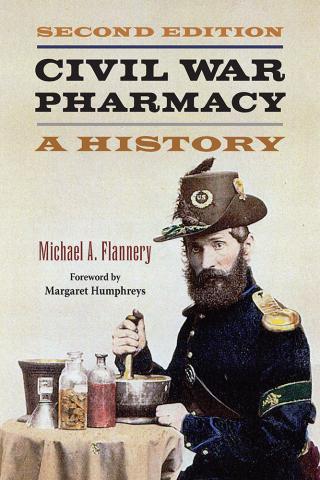By SIU Press
When the Civil War began, the U.S. pharmaceutical industry was concentrated almost exclusively in Philadelphia and was dominated by just a few major firms; when the war ended, it was poised to expand nationwide.
Civil War Pharmacy is the first book to delineate how the growing field of pharmacy gained respect and traction in, and even distinction from, the medical world because of the large-scale manufacture and dispersion of drug supplies and therapeutics during the Civil War.

In this second edition, Michael Flannery captures the full societal involvement in drug provision, on both the Union and Confederate sides, and places it within the context of what was then assumed about health and healing.
He examines the roles of physicians, hospital stewards, and nurses – both male and female – and analyzes how the blockade of Southern ports meant fewer pharmaceutical supplies were available for Confederate soldiers, resulting in reduced Confederate troop strength.
Flannery provides a thorough overview of the professional, economic and military factors comprising pharmacy from 1861 to 1865 and includes the long-term consequences of the war for the pharmaceutical profession.
–
From Google Books:
“This richly detailed book shows why the South found drug provision especially difficult and describes the valiant efforts of Confederate sympathizers to run the Union blockade in order to smuggle in their precious cargoes.
“You’ll also learn about the scurrilous privateers who were out to make a personal fortune at the expense of both the Union and the Confederacy.
“In addition, Civil War Pharmacy illuminates the systematic effort of pharmacists, physicians, and botanists to derive from Southern plants adequate substitutes for foreign substances that were difficult, if not impossible, to obtain in the Confederacy.
“In this painstakingly researched yet highly readable book, Michael A. Flannery, co-author of the critically acclaimed America’s Botanico-Medical Movements: Vox Populi, examines all these topics and more.
“In addition, he assesses the relative successes and failures of the pharmaceutical aspect of health care at the time – successes and failures that affected every man in army camps and in the field.”
–
Comments welcome.
Posted on June 7, 2017


